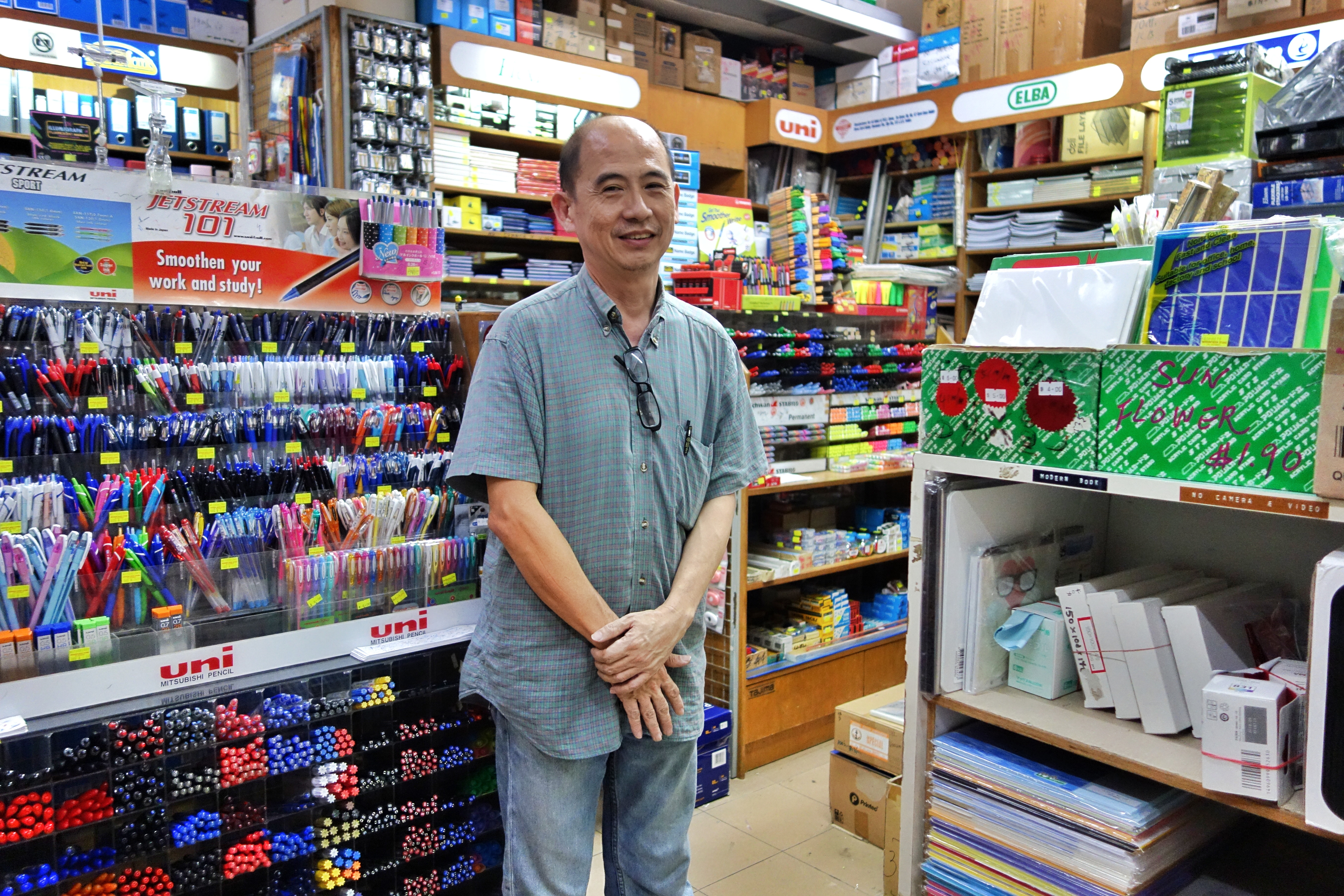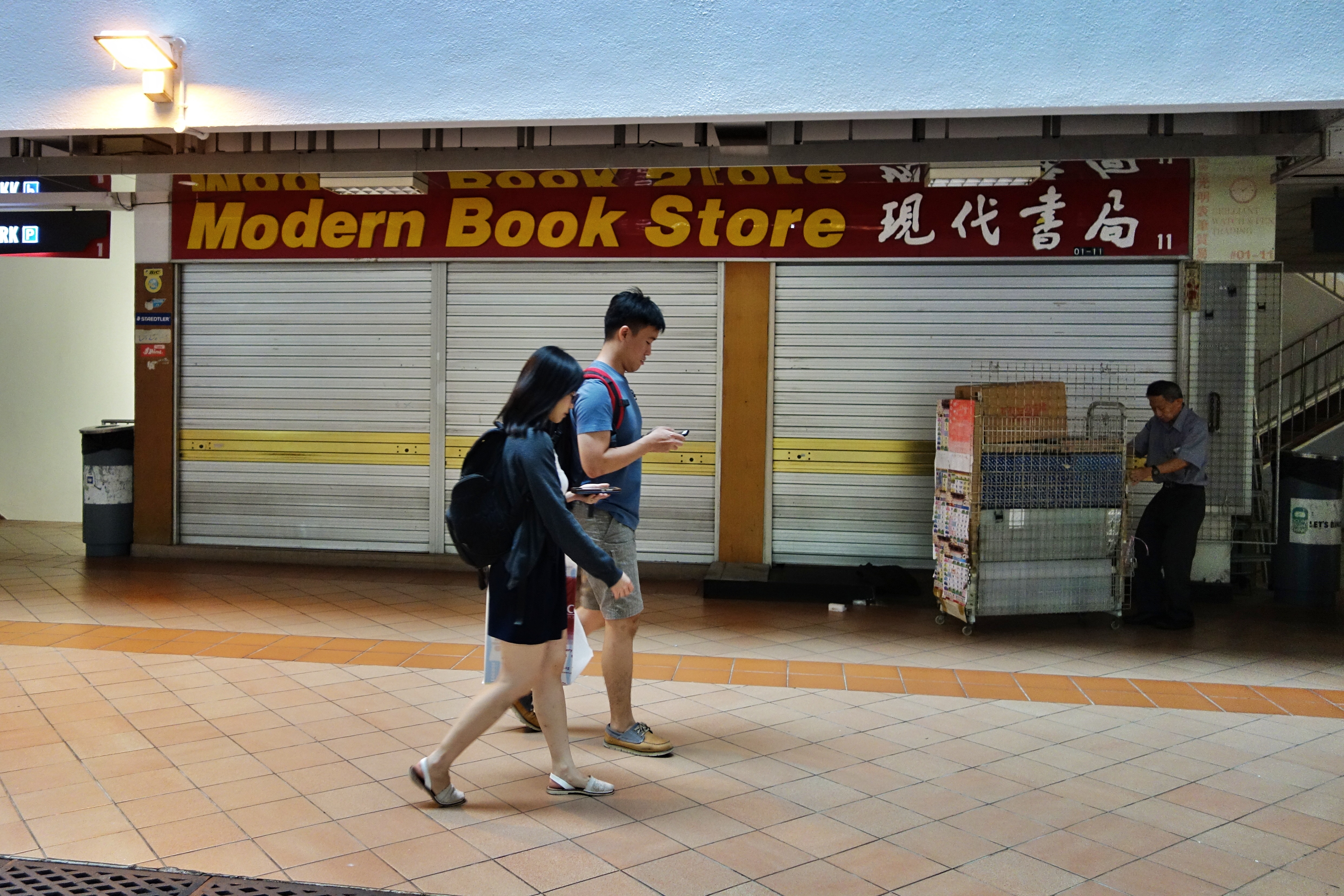
The owner of Modern Book Store is Mr Tan. He has run the shop for the past 30 years. His stock has stayed the same despite the decades, reflecting a time capsule of objects that bring back tactile memories for students and office workers : highlighters, staplers, glue, and post-it notes.
Mr. Tan shares how his tips for running a business, and some of the struggles.
1. Have expertise in the trade
This bookstore was inherited from his father, and he assumed responsibility upon his father’s passing. “I had no choice,” he says with a shrug, as he had already been helping his father run the shop, and had grown to know the ins-and-outs of the trade. His deep knowledge of selling stationery is derived from his family lineage: his grandfather also sold stationery and books.
2. Keep prices competitive
Mr Tan’s shop is crammed with shelves and stock. In the same building, Popular bookshop – a chain store – is far more spacious with a wider variety of stationery in an air-conditioned milieu. To cope with this competition, Mr. Tan keeps his prices similar to the bigger stores. “Cannot be too expensive or else people will come once, and they won’t come back again.”
3. Identify changing behaviour of customers

Mr Tan’s inventory remains unchanged over the decades, even though the crowd has transformed. Foot traffic has dwindled considerably. Mr Tan explains: “Last time, around ten to twenty years ago, still got people come. Lunch hour, office workers come to pick up what they want.” However, he sees fewer workers shopping during their lunch hour. The urgency of picking up stationery in this digital age may have waned when people are mostly on their digital devices.
4. Secure stable revenue sources such as B2B
Mr Tan used to supply stationery in bulk to the nearby offices, which brought him a steady and reliable source of revenue. However, these bulk orders have dwindled to just a couple of offices that continue to use his service loyally. It seems that the new generation prefers the convenience of online ordering, eliminating the need to physically visit a store and personally select their supplies. . “New people have taken over in the offices, and now they order online so they don’t need to walk down here to choose what they want and buy.”
Businesses should look for opportunities that ensure a consistent stream of revenue, and make it easy for customers to place their orders.
Do you know where your office gets its stationery? What role is your office playing in shaping the small business landscape?
6. Beware of high costs such as rent
Managing the costs associated with running a business is essential. Rent, in particular, can be a significant financial burden. Mr. Tan advises small business owners to be cautious of rent expenses, as it can be a considerable challenge to sustain profitability. He is fortunate enough to own his own shop, as do most people in the building, but he is still repaying the loan.
He describes the changing pressures faced by small and independent businesses: “Last time, it was easy to rent a shop in the neighbourhood. But now, even the shops there will die. You need to pay 3 months rent and a downpayment, but you have no idea how your business will do when you start.”
“Rent alone will kill you. Last time, it was easy to rent a shop in the neighbourhood. But now, even the shops there will die.”
5. Consider the impact of competition

Mr. Tan highlights the competition from supermarkets located conveniently near MRT stations, which undermines the viability of small local businesses. Assessing the competitive landscape and finding unique value propositions is vital. “Today, every MRT station has an NTUC supermarket, so there is no point buying from the neighbourhood shops.”
Mr Tan is hanging on to his business and it will keep running until it has served its original purpose and goes extinct. At his age, he sees few avenues for change in such a small store space. The strength of his business will depend on customers who appreciate the familiarity of his service in the mom-and-pop store. “It is up to the individual if they want to come here or go to other bookshops.”
7. Embrace your personal brand
When you are competing on product and price alone, it can be hard to keep the sales afloat with competition. There is not much to differentiate you. A memorable brand can help you stand out. Mr Tan’s strongest brand was his personal brand – he is a familiar and friendly shopkeeper to all – but notably, his customers are growing old, and with them, his brand.

Come and wander around this little treasure trove
If you love art and stationery, Modern Book Store is a place of delightful tools like sparkling pens and construction paper. If there is something you want that he doesn’t carry, just tell Mr, Tan!
Where is it?
You will find this shop at Bras Basah Complex in Singapore on the first floor. The mall is also known as the City of Books because it is filled with independent bookshops, stationery shops, art galleries, music supplies, and other treats for the senses 🙂
Shopkeeper Stories is a photographic documentary of small business owners with their trades around the world, sharing their views on business and life. You can catch all the posts on Facebook and Instagram @ShopkeeperStories. See you there!